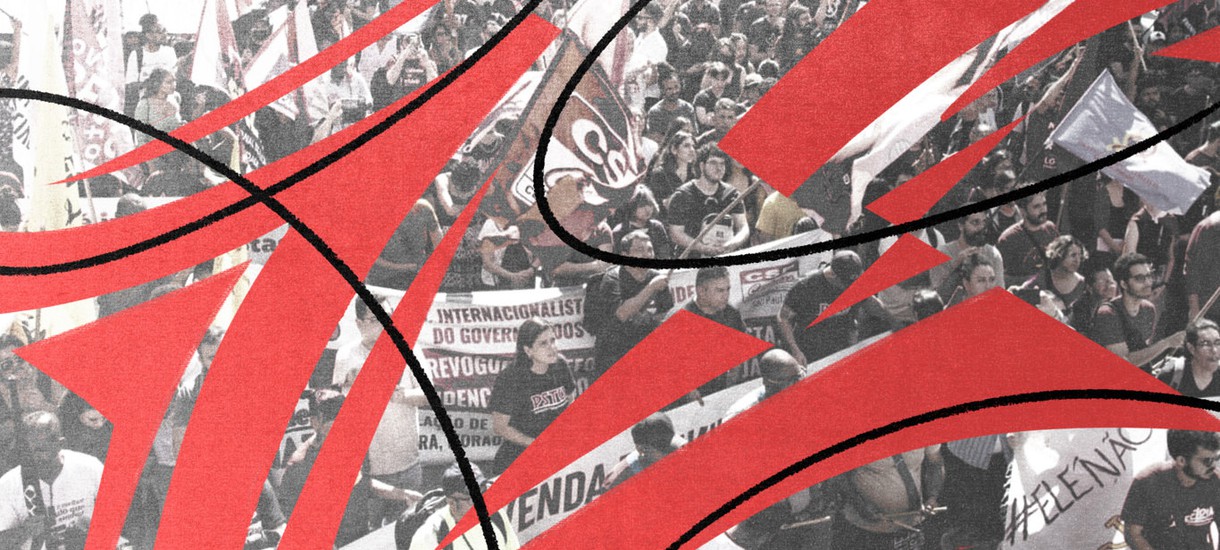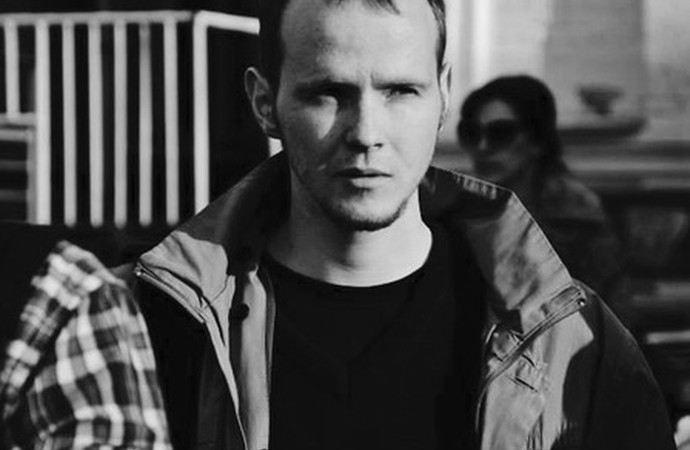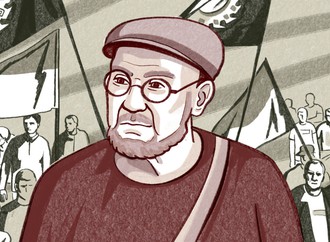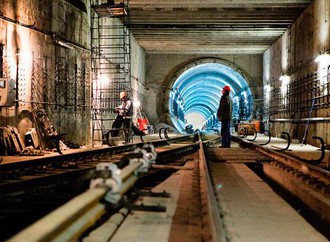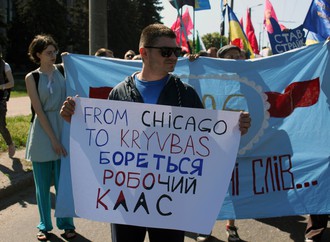Every year left-wing and trade union communities celebrate Labour Day – the day of resistance and solidarity in fighting for peace and worker’s rights. In Ukraine we constantly have discussions around this date’s meaning and importance. May Day as a day off not for picnics but for demonstrations of left-wing and trade union solidarity. We had a conversation regarding the daily worker’s struggle and the meaning of solidarity with our trade union friends from Poland, Belgium, Brazil, and Lithuania.
Does solidarity need a symbolic date?
Politics and tradition of commemorating the 1st of May differ from country to country and depend on historical context. In Poland May 1st – Labour Day – is just another holiday, May 2nd is the Flag Day (no day off) and May 3rd is the Constitution Day. So for ordinary citizens they are so-called “long holidays” or “May holidays”, the time for picnics, parties and trips outside the city. Some trade unions and political organisations hold rallies in Poland’s largest cities but participation there is not that big, mostly because during the so-called “communist” period participation in Labour Day demonstrations was mandatory, so lots of people don’t associate this date with something positive. Because of this, the trade union called Inicjatywa Pracownicza (IP) has ceased to organise Labour Day events.
“The important and radical protests take place on other dates – not related to any anniversaries or public holidays. For me personally, it is also a day off, and an occasion to rest. I keep an eye on what’s happening around the world on this day, as I do it on a daily basis. There are many important dates in the labour movement. I don’t think that class struggle needs any particular calendar dates,” says Ignacy Jóźwiak, member of the IP trade union.
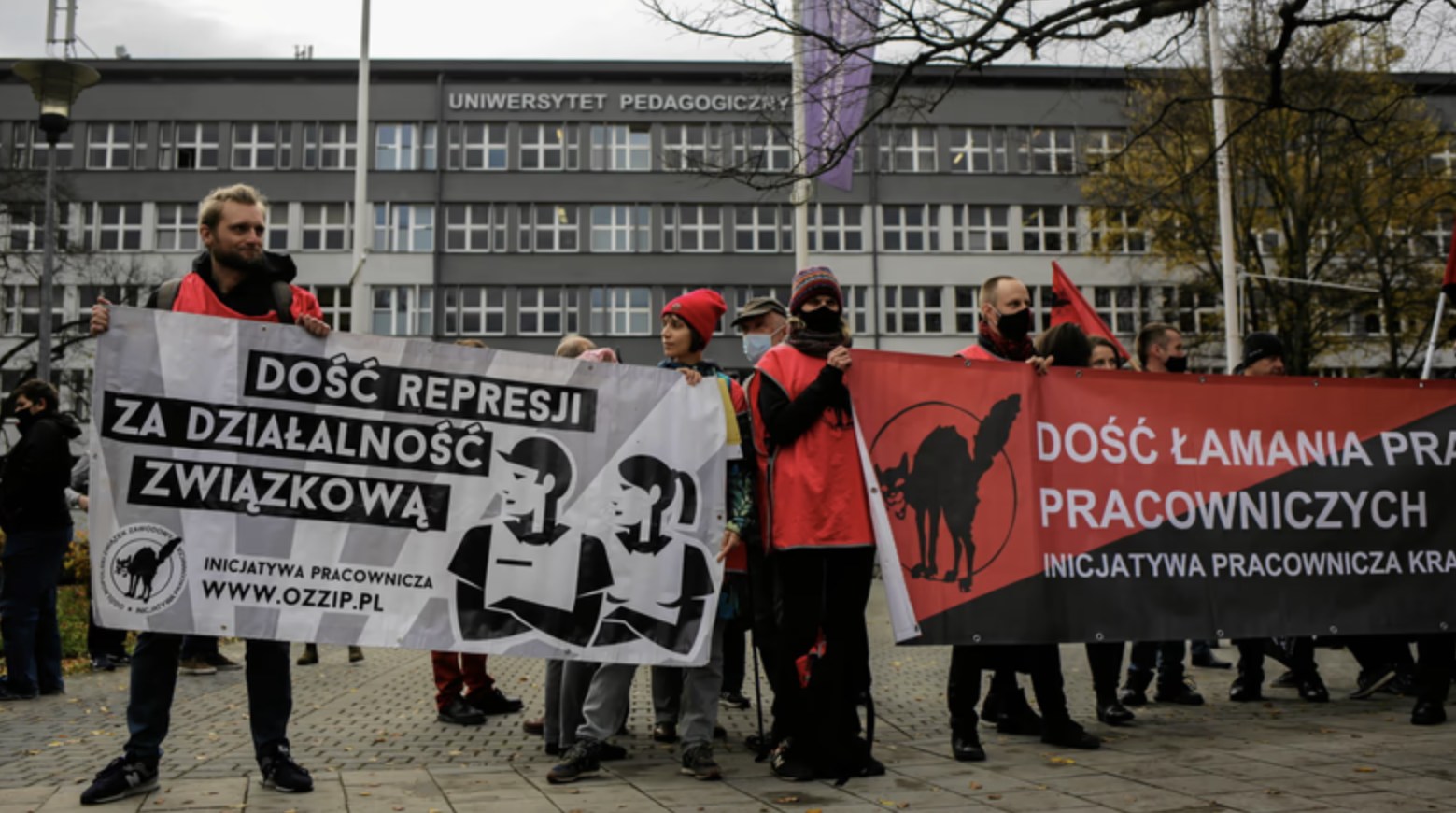
Protest by Inicjatywa Pracownicza in front of the Pedagogical University, 4th of November 2021. Photo by Adrianna Bochenek / Agencja Wyborcza.pl
In Lithuania this date is still an important holiday, despite the attempts of the right-wingers to cancel it as “communist”. Lithuanian trade unions celebrate it and emphasise that because of the organised labour movement everyone in this country has a right to a normalised working day, rest, social and medical insurance, additional payments for overtime and night shift work, unemployment benefits, paid leave, pregnancy, childbirth and maternity leave, family matters leave etc. “All this exists thanks to well-organised international trade union movements and their influence on decisions made by politicians,” Dalia Jakutavičė, a member of Lithuanian Industry Unions Federation (LITUF), has commented on this issue.
In Brazil the 1st of May is a holiday, and trade unions and left-wing organisations call for demonstrations in the country’s major cities every year. Herbert Claros of CSP-Conlutas trade union believes that it is an important day to show the unity and power of the working class.
In Belgium the perception of Labour Day varies. “Under the influence of liberalism, and even among some workers, May Day is a day of labour. For the country’s trade unions, May Day is workers’ day. A day dedicated to remembering and commemorating the struggles of workers who, sometimes at the risk of their lives, fought to win new social rights. May Day is indeed a day to commemorate and celebrate the struggles of workers, but also a time to remind that the fight will not be over until workers regain full control over the means of production,” says Charles Hampton of General Labour Federation of Belgium (FGTB), who is also a member of Anticapitalist Left party.
And so the historical context greatly influences the attitude towards May Day in society. Discussions around this day in the post-Soviet space make even certain activists less attached to this date, obviously without compromising its values or the struggle it personifies. At the same time in lots of countries, for instance Sweden, Norway and Finland, the 1st of May is a day off around which the trade union and left-wing mobilisation and protests occur.

Labour Day in Kyiv, 2021. Photo by politkrytyka.org
Common issues of nurses and Uber drivers. What do trade unionists do in different countries
There are a lot of challenges for trade unions of today which complicate the work of activists and worsen the conditions of workers. One of the most vulnerable and underprotected groups of workers are young adults. Some of them can take current labour rights for granted whereas more precarious youths did not even see those rights.
“Liberal political forces and employers in Lithuania propagate the individualistic approach. So-called self-employed workers are interested in paying less taxes and working “whenever you want and however you want with no restrictions”. But only a handful can become successful entrepreneurs while the majority of self-employed feel very uncomfortable in the case of illness or when they give birth to children or lose their job. Precarious youths have only minimal social guarantees. It became clear during the COVID-19 pandemic – self-employed were less protected compared to those who had employment contracts. This situation is beneficial first and foremost to employers by significantly saving their money,” says Dalia.
In Poland young adults successfully protect their rights by joining trade unions en masse – new trade union structures appear in various sectors. “If we talk about unions, only about 10% of the employed are unionised. Unionisation has been dropping radically since the 1990’s. On one hand, the strongholds of radical working class resistance in heavy industry have been closed over the last three decades (and the rest remains under constant threat of closure). On the other hand, the reputation of unions went bad due to their involvement with major centrist parties in government. But recently the unions are getting more and more active in green energy, light industry, logistics, retail, services, IT, media and others,” Ignacy Jóźwiak explains.
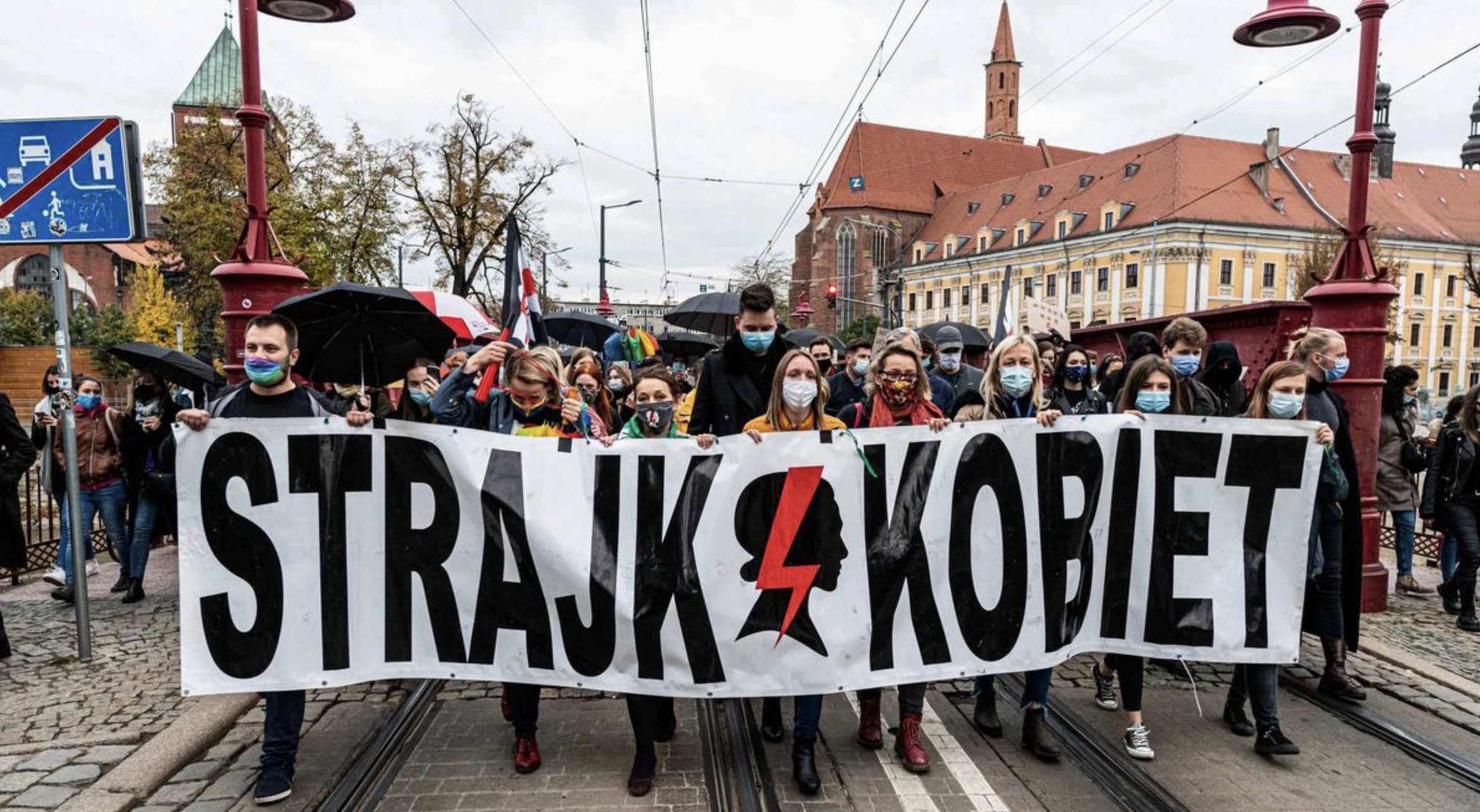
Women strike in Poland due to the abortion ban, 2020. Photo by Krzysztof Kaniewski
One of the challenges of this situation is that many trade unions in Poland start from scratch in new enterprises, new sectors which have never been unionised. Another challenge is the “zero-tolerance” policy in many companies and the so-called “union busting”. These companies refuse to acknowledge the presence of unions, question their legality, deny union organisations their basic rights such as displaying their materials in the public space of the workplace, fire active union representatives. There are legal companies which specialise in fighting the unions. Then there is a very restrictive and complicated legal procedure with organising strikes, which makes them near impossible in Poland.
“The main challenge though and the main obstacle is the aforementioned low level of unionisation. When more people get organised and take direct action in their workplaces in defence of their rights, less employers will be tempted to abuse their insecurity. By direct action I mean involvement directly at the workplaces: raising collective voices, refusing to work in conditions the workers find unacceptable, putting pressure on the employer,” Ignacy Jóźwiak says confidently.
“The labour movement remains important in Belgium because of a high rate of unionisation and a significant presence of the unions in the country’s socio-economic management bodies. Conflict is growing with the employers and the government who are taking advantage of repeated crises (COVID, war in Ukraine and energy prices) to go on the offensive and destroy social gains. Numerous protest and/or strike movements have taken place in recent years, at company, sectoral and national levels, including days of general strike and nationwide demonstrations. The challenges facing the labour movement include a better consideration of feminist, ecological and anti-racist struggles, an adaptation to the realities of new forms of work and the phenomenon of “uberisation” and a stop to the neoliberal attacks. We strongly feel about strengthening internal democracy of the structures and questioning the power of the trade union bureaucracy. We must transition from a service-based approach, when one union leader takes care of people’s problems with one manager, to a militant one, when everyone in a trade union is ready to act for the common result,” says Charles Hampton.
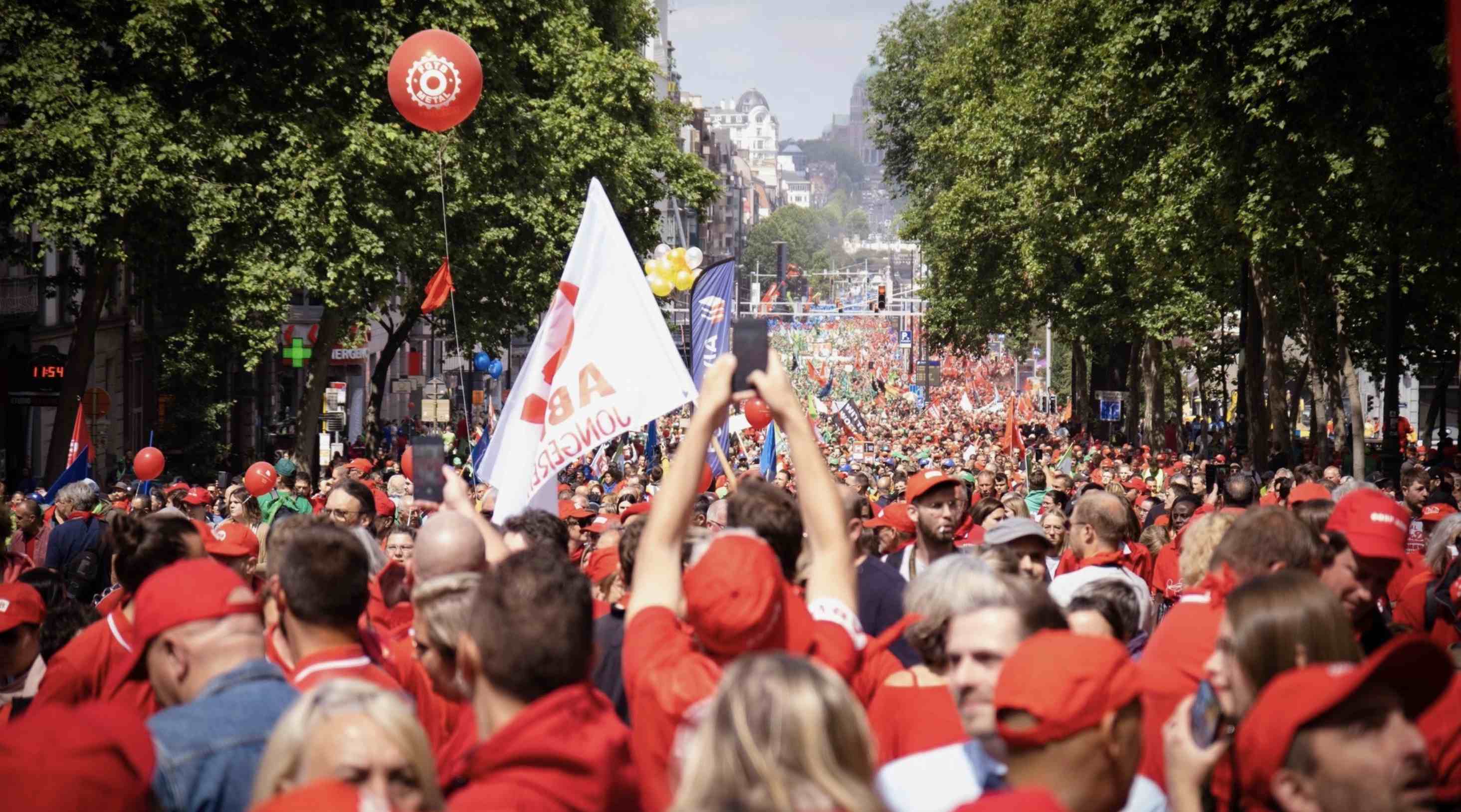
Mass worker demonstrations in Brussels, 2022. Photo by ABVV
The Brazilian working class has been heavily attacked in recent years with neoliberal reforms and loss of rights such as pension and labour reforms, increased unemployment and precarious work. Herbert Claros says that those are the consequences of four years of Bolsonaro’s far-right government which directly targeted trade unions.
As we see, trade unions across the world face the same problems. In countries where the trade union movement is weak, the society is not sufficiently informed about the results of the struggle whereas in countries where the trade union movement is strong, the activists are looking for ways to involve people into the labour movement. Sometimes the state of the trade union movement in a country can be drastically changed through the government’s actions, but overall the left and social democratic forces support the growth of the movement while the neoliberal and conservative right tend to attack the self-organising efforts of the working class directly or covertly.
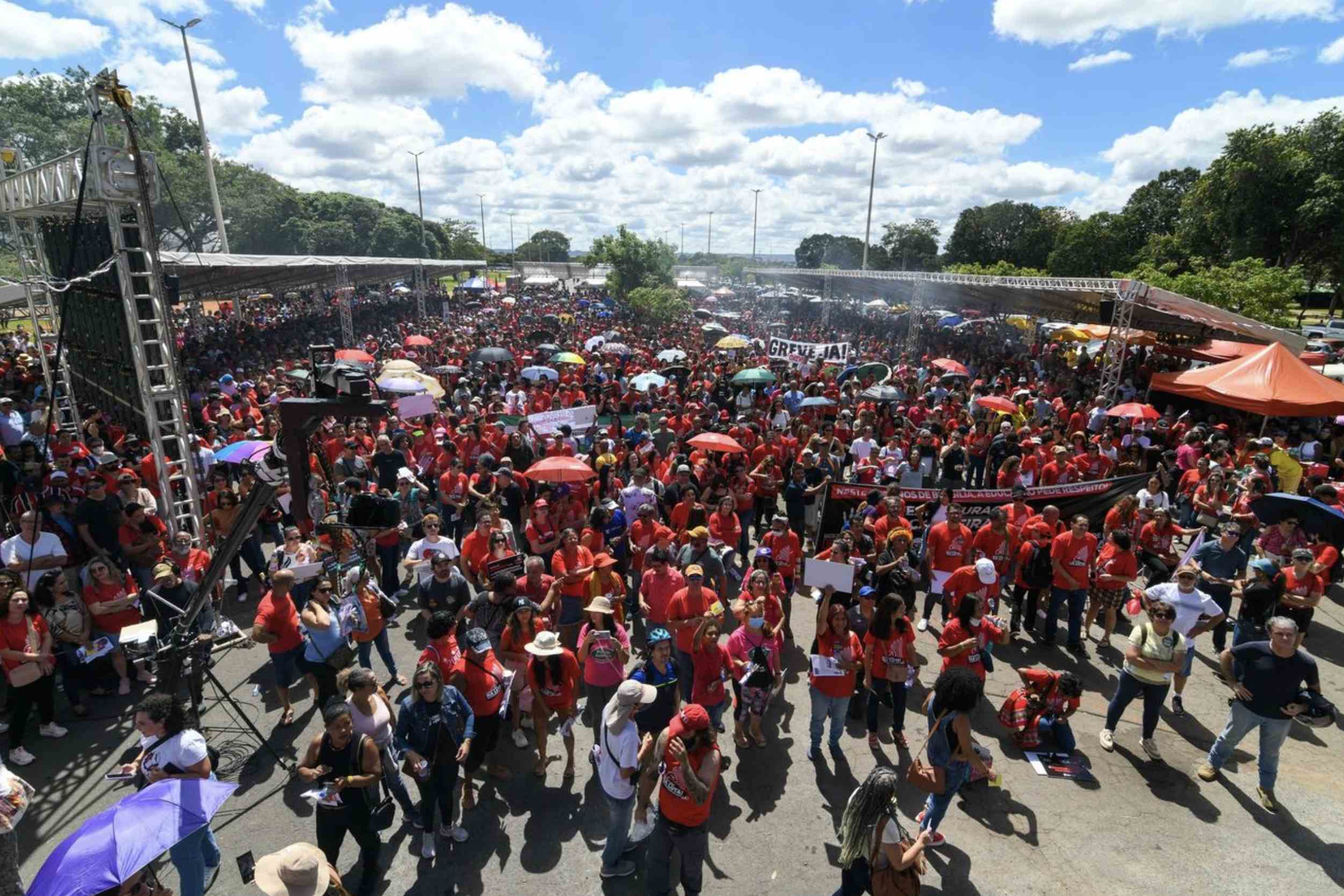
Thousands of Brazilian teachers organised a national strike against low salaries and high school reforms, 26th of April 2023. Photo by SINPRO via Facebook
What do the workers of Poland, Brazil, Lithuania and Belgium fight for?
Trade unions are actively striving for social and democratic transformations. They think that the general well-being of the people must come first, not the profits of the businesspeople.
“Benefits created by workers’ hands must be available to all and distributed in solidarity. To put it shortly, humans and their well-being are a top priority for us. On the other hand, politicians, lobbyists and business structures are trying to instil a thought about the obsolescence of the ideas of affordable hospitals, schools, kindergartens, utilities, power, heat and water supplies, as if making those spheres private will make them better. But such a narrow and short-sighted approach of business lobbyists is harmful to the society and private sector’s services become unaffordable to people who live from paycheck to paycheck,” Dalia Jakutavičė explains.
Media rarely publish stories of successful struggles for better work conditions, despite the fact that journalists themselves are precarious workers. However, Polish media could not ignore last year’s “wildcat strike” of public transit workers in the city of Bydgoszcz. “The workers managed to get some pay raise and improve the communication with the management. In March this year they established a section of our union (Inicjatywa Pracownicza) and continued their involvement. Last year there was also a strike at the Solaris bus factory in the town of Bolechowo with support from OPZZ and Solidarność unions. It was the largest and the longest strike in a private company in a very long time. It lasted 40 days and ended with partial victory for the workers who got pay rises,” Ignacy elaborates.
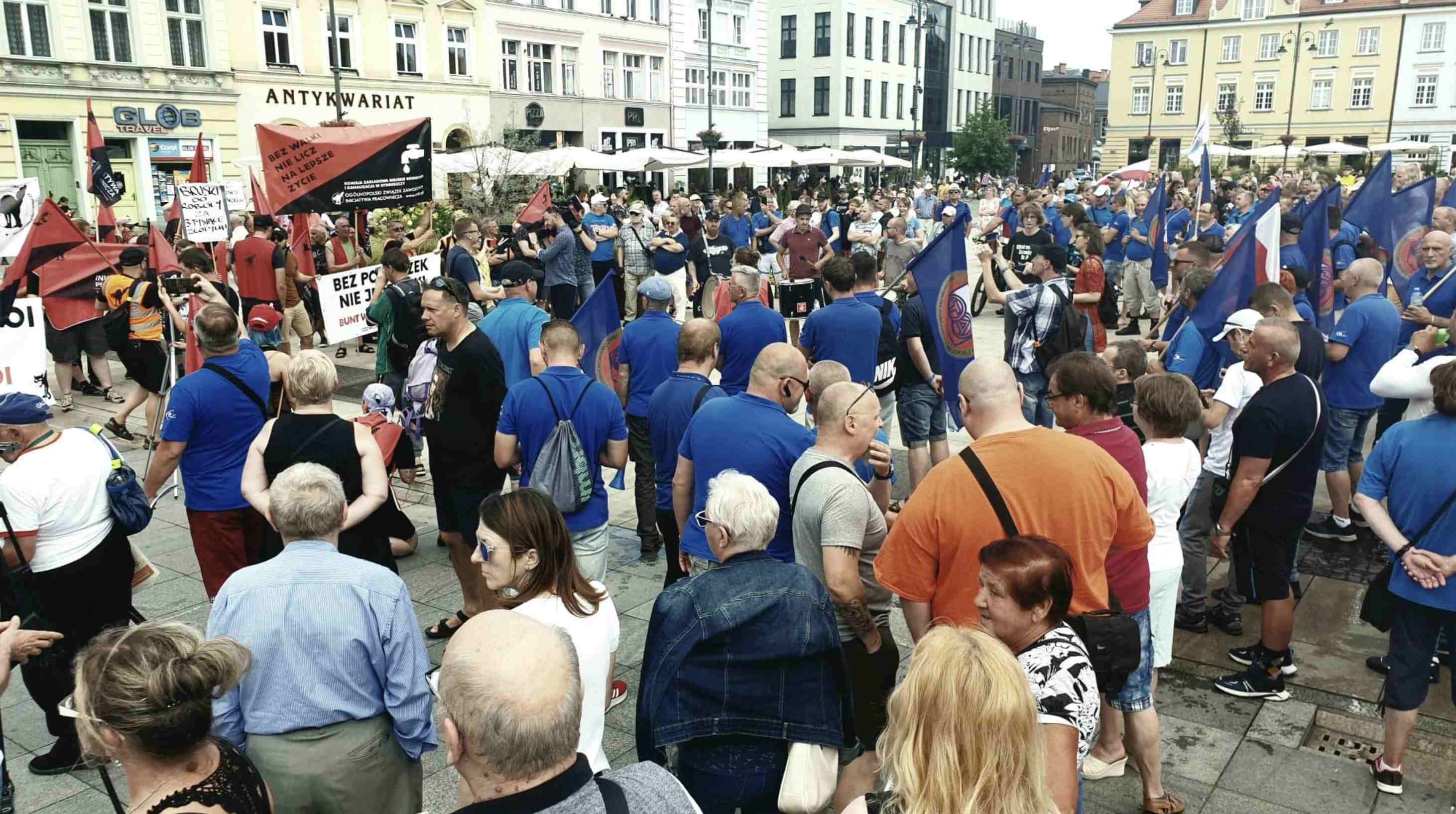
“Wild strike” of public transit workers in the city of Bydgoszcz, 2022. Photo by Rozbrat.org
During the pandemic everyone saw how profitable logistics and online sales sectors were. But employees who form, sort, pack and deliver packages have not felt the increase of their salaries. As of now there is a campaign to unionise Amazon workers and here, as per Ignacy, the IP trade union is involved. “They keep fighting for higher salaries and lower (more realistic) norms. They are in the process of collective bargaining and repeatedly organise strike referendums which take place in all warehouses all over Poland and the company uses various tricks to discourage people from voting or to prevent the voting from taking place. Amazon is a global and powerful giant but organised workforce makes it more difficult for the company to act as it wishes. Amazon workers are also organised on the international level within the Amazon Workers International union coordination. They keep each other informed and coordinate their campaigns,” Ignacy Jóźwiak explains.
Another example of a successful coordination on a national level has been demonstrated by Brazilians who stood united last year to fight against the ultra-right coup which occurred on the 8th of January. The independent trade union movement pressures the Lula government to revoke neoliberal reforms that attack workers’ rights. Herbert considers the defeat of Bolsonaro important for the Brazilian working class. He also thinks that although this victory has been won through elections, the working class continues to resist capitalism in the cities and in the countryside.
The coronavirus pandemic has raised a crucial discussion on the importance of the public health sphere and has caused an increase in labour disputes in this sector. In Belgium there have been many rallies and strikes that played a paramount role in politicising the participants as the people got informed about the state of this sector whereas its workers found out about additional financial resources. “At the cross-industry level, the trade unions are leading the fight against the Salary Moderation Act introduced in 1996 and reinforced in 2017. This fight is being reinforced following the rise in the cost of living and historically high company margins. This struggle has led to several local, sectoral and national actions, such as a general strike on the 9th of November 2022 and a national demonstration on the 16th of December,” Charles explains.
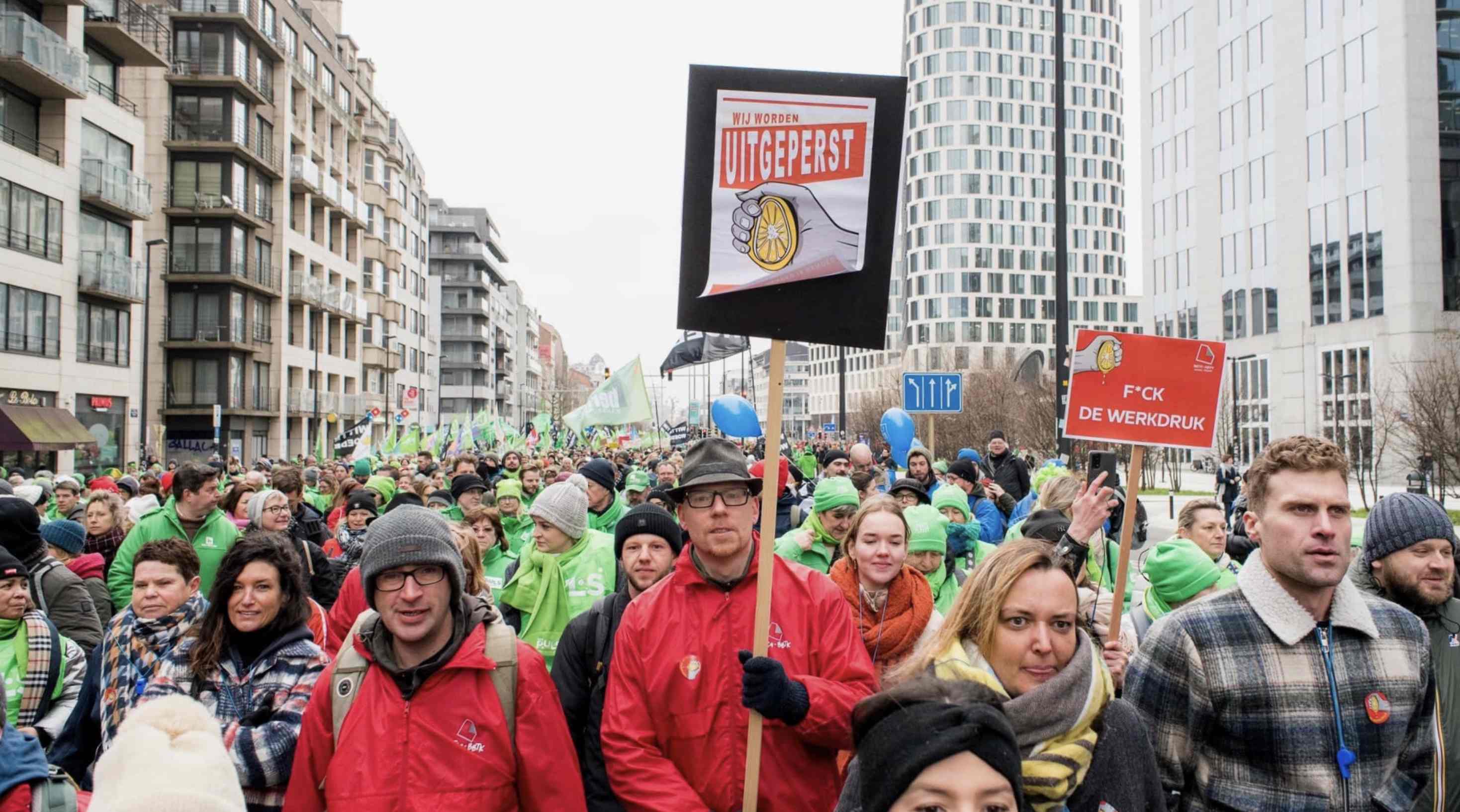
Mobilisation of workers in Brussels, their demands are refinancing and the increase of the number of healthcare and non-commercial sector workers, 2nd of February 2023. Photo via Medicine for the People-MPLP
Besides healthcare, the pandemic has highlighted the significance of the logistics sector for business processes as it has sharply increased their profits.
At the end of April we received the information about the successful outcome of the Georgian and Uzbek truck drivers’ strike in Poland-based companies Agmaz and Lukmaz. The strike itself took place in Germany for three weeks. The companies owed them 300 thousand euros of unpaid salaries. They refused to talk and sent the private security (basically a paramilitary unit) to suppress the protest and take the trucks by force, but they did not succeed. They also brought other drivers to the spot to act as strikebreakers and these drivers joined the protest which was supported by German unions and activists. “The company owner and the leader of the “private army” attempted to hold a press conference in front of the German embassy in Warsaw to present their point of view. But members of our union interrupted them. The workers’ voices could be heard much better than the bosses’ voices,” Ignacy joyfully explains.
How the Russian invasion of Ukraine has, at the same time, strengthened and weakened international solidarity
International solidarity of the working class helps solve problems on different levels by supporting national trade unions and local struggles on specific enterprises, democratic struggle of the working class (protests in Brazil, Iran, France, Kazakhstan etc.), environmentalist actions of the working and indigenous peoples all over the world. As we witness the rise of anti-imperialist struggle, we also see the rise of an international front against capitalism, racism and patriarchy. Given this context, progressive trade unions join in the support of the Ukrainian resistance.
“We see a lot of expressions of international solidarity of the working class every day but it’s not perfect. There are many debates within left organisations about the nature of the war and the nature of support for the Ukrainian people and working class,” Charles says.
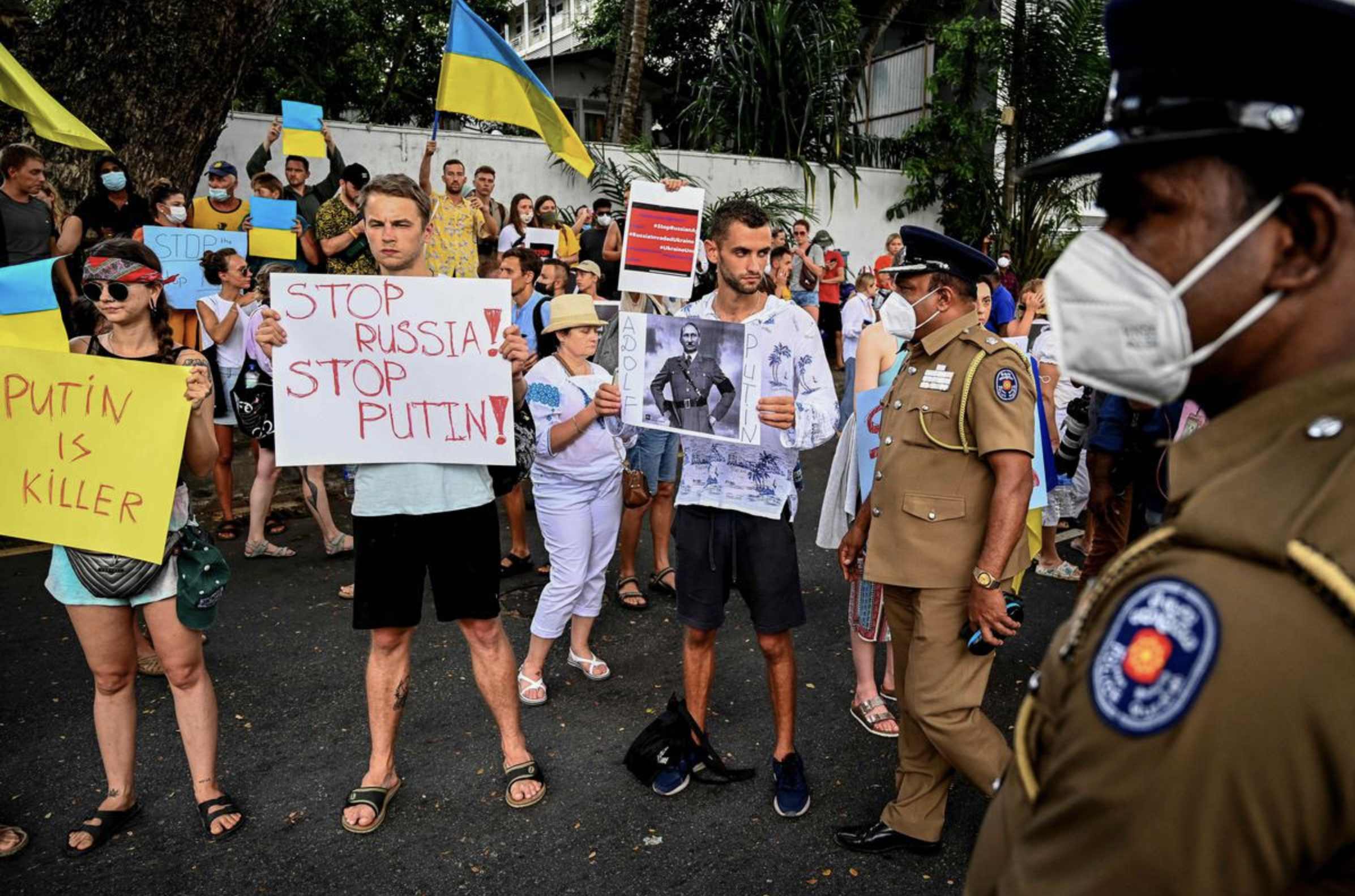
Demonstration in support of Ukraine in Sri-Lanka, 2022. Photo via open sources
These debates also take place within the Belgian trade union organisations. While some refuse to call this war a Russian imperialist war and prefer to focus all the attention on NATO, others do not hesitate to consider this war as truly imperialist. While some call for abstract pacifism, others do not hesitate to support the sending of arms to give the Ukrainian people the means to defend themselves.
“Capitalism is global, the working class is exploited in the same way anywhere in the world. Therefore, international solidarity is fundamental to defeat the capitalists and their representatives in governments. All over the world, whether in the USA or in China, the rulers are at the service of the interests of big corporations. It is fundamental to build the international mobilisation of the working class to defeat the governments and put power in the hands of the workers. At the moment, our union is in an international campaign of solidarity with Ukrainian workers against the invasion of the Russian army commanded by the tyrant Putin. We, from Brazil, have also even been part of two convoys of solidarity with independent trade unions in Ukraine,” Herbert Claros says. Also Brazilians from CSP-Conlutas played a crucial role in organising protests during Sergey Lavrov’s visits to Brazil in April of 2023.
Ignacy Jóźwiak underscores the significance of the Ukrainian resistance for the global resistance to exploitation and oppression. “To me Ukraine is not in the “East”, “West” or the “Center” of Europe. I see Ukraine and the popular resistance of the Ukrainian masses among movements for social justice; among the colonised peoples fighting for their self-determination and among those who oppose racism, apartheid and other forms of structural violence. Of course there are a lot of inequalities and injustices within Ukrainian society. And this is why our solidarity should go to those who resist and seek justice,” he says confidently.
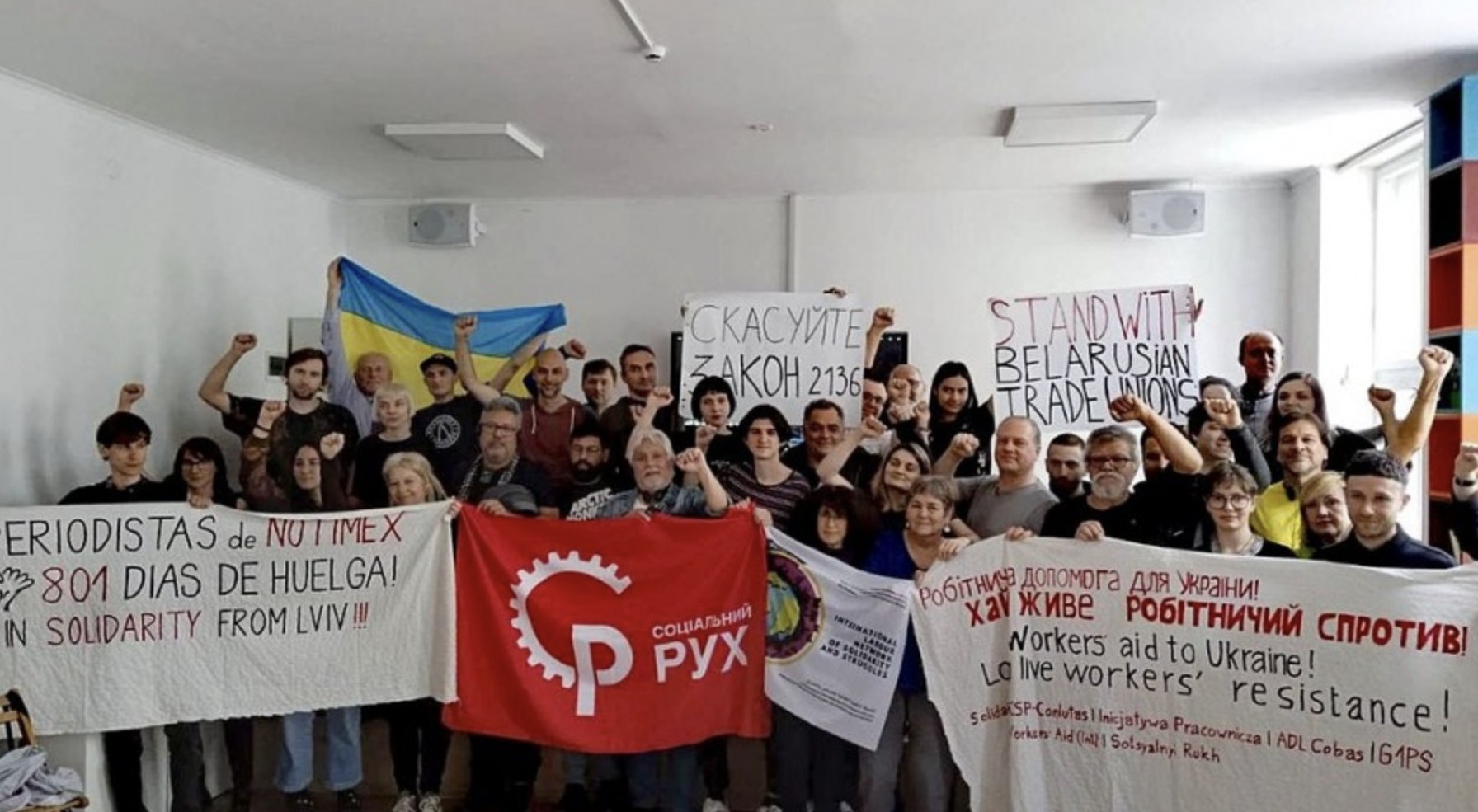
Meeting of an international trade union convoy “Workers Aid to Ukraine”, an international initiative which consists of mass trade unions of European and Latin American countries, Lviv, 1st of May 2022. Photo via rev.org.ua
From the beginning of the Russian invasion of Ukraine, International Labour Network of Solidarity and Struggle, of which the Polish IP is a member, organised several fundraising campaigns in support of Ukrainian trade unions. They organised two convoys of Workers Aid to Ukraine, one to Lviv and another to Kryvyi Rih, combined with small conferences and study visits. They gave them everything they needed, from long-term storage food to tactical gear. And in cooperation with British trade unions, the IP helped the Ukraine Solidarity Campaign purchase and deliver a pickup truck to trade union activists. Their international delegation consisted of union members from Lithuania, Poland, France, Italy, Austria and Brazil.
“The main goal of trade unions all over the world is to protect the common good and to remind everyone that governments serve the people, not vice versa. Sadly, from time to time there are incoming proposals to cancel the Labour Day holiday in Lithuania, as if it is a Soviet heritage,” Dalia Jakutavičė says. But to her deep conviction, only politicians who want to harm the country and the global movement that is not a Soviet invention and has existed longer than some governments want this. She also points out that both the Ukrainian society and peoples of the world will survive only when we will be working together and creating the common good.
